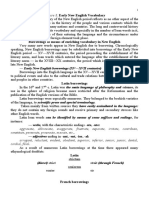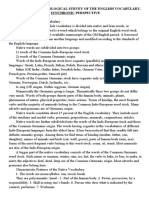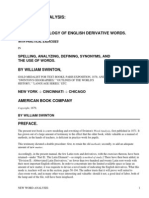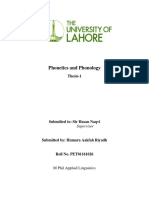0 ratings0% found this document useful (0 votes)
42 viewsEnglish - Number, Gender, Case, Definiteness/indefiniteness
English - Number, Gender, Case, Definiteness/indefiniteness
Uploaded by
Анна АлександрияThe document discusses various grammatical changes that occurred in the history of the English language from Old English to Modern English, including:
1. The loss of inflectional endings on adjectives and nouns, which led to the development of analytical grammatical forms.
2. The disappearance of grammatical gender and cases such as dative.
3. The origins of various grammatical structures in Modern English, such as the gerund and present-day verb forms, from their predecessors in Old English.
4. Phonological processes like the Great Vowel Shift that impacted the English sound system and morphology over time.
Copyright:
© All Rights Reserved
Available Formats
Download as DOCX, PDF, TXT or read online from Scribd
English - Number, Gender, Case, Definiteness/indefiniteness
English - Number, Gender, Case, Definiteness/indefiniteness
Uploaded by
Анна Александрия0 ratings0% found this document useful (0 votes)
42 views7 pagesThe document discusses various grammatical changes that occurred in the history of the English language from Old English to Modern English, including:
1. The loss of inflectional endings on adjectives and nouns, which led to the development of analytical grammatical forms.
2. The disappearance of grammatical gender and cases such as dative.
3. The origins of various grammatical structures in Modern English, such as the gerund and present-day verb forms, from their predecessors in Old English.
4. Phonological processes like the Great Vowel Shift that impacted the English sound system and morphology over time.
Original Title
1525958966651445
Copyright
© © All Rights Reserved
Available Formats
DOCX, PDF, TXT or read online from Scribd
Share this document
Did you find this document useful?
Is this content inappropriate?
The document discusses various grammatical changes that occurred in the history of the English language from Old English to Modern English, including:
1. The loss of inflectional endings on adjectives and nouns, which led to the development of analytical grammatical forms.
2. The disappearance of grammatical gender and cases such as dative.
3. The origins of various grammatical structures in Modern English, such as the gerund and present-day verb forms, from their predecessors in Old English.
4. Phonological processes like the Great Vowel Shift that impacted the English sound system and morphology over time.
Copyright:
© All Rights Reserved
Available Formats
Download as DOCX, PDF, TXT or read online from Scribd
Download as docx, pdf, or txt
0 ratings0% found this document useful (0 votes)
42 views7 pagesEnglish - Number, Gender, Case, Definiteness/indefiniteness
English - Number, Gender, Case, Definiteness/indefiniteness
Uploaded by
Анна АлександрияThe document discusses various grammatical changes that occurred in the history of the English language from Old English to Modern English, including:
1. The loss of inflectional endings on adjectives and nouns, which led to the development of analytical grammatical forms.
2. The disappearance of grammatical gender and cases such as dative.
3. The origins of various grammatical structures in Modern English, such as the gerund and present-day verb forms, from their predecessors in Old English.
4. Phonological processes like the Great Vowel Shift that impacted the English sound system and morphology over time.
Copyright:
© All Rights Reserved
Available Formats
Download as DOCX, PDF, TXT or read online from Scribd
Download as docx, pdf, or txt
You are on page 1of 7
1.
Basic grammatical categories… were lost by the adjective in Late Middle
English – number,gender,case,definiteness/indefiniteness
2. Most peculiar feature of the development… of English personal pronouns –
basis of different dialectal elements
3. d)
4. grammatical category of gender was ruined in Early – was largely ruined
because unstressed endings were lost
5. syntactical source of the present-day analytical form – verb to have
6. simplification of the grammatical forms of presentation of the category of
number of nouns – reduction of unstressed endings
7. irregular plural form of the noun child in Modern – comes back to Old
English vocalic stems
8. origin of the … they – it is Scandinavian borrowing
9. origin of the form of the Modern English possessive case – Old English
genitive case
10.origin of the gerund in Modern English – Old English verbal noun
11.origin of the present-day verbal ending of the third person singular –
Northern dialects of English
12.grammatical category of gender of nouns completely disappeared – the end
of the Middle English period
13.right explanation … of … definite article in English – demonstrative
pronoun
14.syntactical source of the present-day continuous – was the combination of
the verb beon / wesan and participle
15.why the word order became fixed in a Middle English simple sentence –
inflections were mostly lost in Middle English
16.grammatical changes as the result of which analytical forms have developed
in the history of English – Grammaticalization
17.analytical forms of the oblique moods in English – subjunctive forms were
lost as a result of the reduction
18.basic reason for the appearance of numerous formations by analogy in …
system of strong verbs Middle… Modern – result of the ruin of gradation
patterns
19.origin of the particle to before the infinitive in Modern English – a
preposition
20.syntactical source of the present-day analytical form of the future tense –
willan and the infinitive
21.origin of the grammatical form of the Modern English personal pronoun –
plural nominative form
22.adjective lost its inflectional forms – reduction of unstressed vowels in
inflections
23.part of speech … has acquired new grammatical categories – the verb
24.personal pronoun of the second person singular disappear from the every-
day literary language usage – seventeen-eighteen centuries
25.origin of the past ending –ed of … regular verbs- dental suffix of Old
Germanic
26.archaic form thou – personal pronoun of the second person singular
27.double negation – in Late Modern English
28.for the weakening of case endings in nouns in Middle English – action of
reduction of unstressed vowels
29.development of modal verbs in English – preterite-present verbs
30.the present day analytical form of the passive voice – basis of the compound
nominal predicate (the verb beon/wesan and participle ||)
31.irregular plural form of the noun ox (oxen) – Old English weak stems
32.feet, geese, men – English root-stems
33.disappearance of the dative case in Middle English – changes in the
semantic structure of the case
34.grammatical categories of the adjective – only the grammatical category of
degrees of comparison
35.deep in the phrase four feet deep - of the adverb
36.Modern English suffix of adverbs – combination of the Old English
adjectves… and … the Old English adverb
37.reason for the ruin of the gradation patterns – as a result of phonetic
changes
38.of the grammatical form hath + past participle – action performed in the
past and connected with the present
39.present-day English non-standard verbs – strong and weak
40.shall and will … in the times of Shakespeare – shall and will for the
persons was not yet fixed
41.grammatical forms …of the verbal paradigm – in Late Modern English
42.write-wrote-written and bite-bit-bitten – regular phonetic changes
43.new parts of speech in Middle and Early Modern English – Particles and
interjections
44.“when yellow leaves ,or none , or tew” – stylistically neutral grammatical
45.my and mine in the times of Shakespeare – grammatically conditioned
46. possessive pronoun its appeared – Early Modern English
47.indefinite article in Modern English – to the numeral
48.origin of the regular plural noun ending in Modern English – a stems
49.present subjunctives form
50.basic pattern of the development of Modern English regular verbs – class 1
(regular) and verbs of class 2
51.time of the appearance … first French loan-words in English – Benedictine
reform
52.functional character of Early Modern English French – widely used in oral
53.semantic spheres of use of Old English Latin loan-words do - spheres of use
in that period were religion , education , and learning
54.explains the appearance of the suffixes : -able, -age, -or, -ess – they are
borrowed suffixes from French
55.origin of the Modern English lexemes : cattle , to catch , to carry , carriage –
adopted from Old Norman French
56.the appearance of the lexemes : schools, priest, cheese, wine – from French
in Late Middle English
57.the main sources of loan-words in Middle English – the most part of
Middle…Scandinavian, French, Latin
58.basic reason for the development of… the Scandinavian loan-words into
English – the settlement of the Danes and the Norwegians in Anglo-
Saxon England
59.historical and social background to the French influence on the English
language – after the Norman Conquest
60.the dominant semantic fields of French … before the thirteenth century –
government, administration, military, activity
61.shirt/skirt, shatter/scatter, to raise/to rise – they arose … as a result of
Scandinavian
62.to catch/to chase, cattle/chattel – borrowing from different dialects of
French: Central French, and Norman French
63.what suffixes – suffixes : -ance, -ment , -ous
64. the chronological frames of the less assimilated French – they mainly
came… seventeenth-eighteenth
65.the basic reason for the development of the … background to Latin loan-
words in the Modern English period – inflow of Latin … by the
Renaissance and the Industrial Revolution
66.dominant semantic fields of Italian loan-words in the history of English –
Finance, military, activity and cookery
67.Spanish loan-words in the history of English – the Great Geographical
Discoveries
68.Right explanation for the origin … sciences, the Humanities and technology
in Modern English – lexemes… from Latin
69.etymological doublets: strict/strait, feat/fact in English – dialects of French:
Central French and Norman French
70.historical and social background to Italian loan-words in the history of
English – the age of the Renaissance
71.Latin loan-words in the Old English period – the introduction of
Christianity
72.Set of the Modern English lexical units … only of Americanisms – Movies,
gasoline, fall, sidewalk.
73.set of… etymologically… only of Spanish loan-words – embargo, tornado
74.set of the Modern English lexical … only of Italian loan-words – soprano,
mafia
75.set of Modern English … only of German loan-words – Zinc,
semester,blitz,waltz
76.only of Dutch loan-words – landcapes,reef
77.word-formation devices… characterized by the highest level …English –
Suffixation
78.development of the English lexis – introduction of Christianity
79.tartan, kilt, dun, crag(rock), in Modern English – borrowing from Celtic
80.conversation … in the history of English – in Late Middle English
81.the most productive in old English – prefixation and suffixation
82.English… considerable in number – Latin and French loan-words
83.The basic reason for a quick assimilation of Scandinavian loan-words in the
English language – the Scandinavians was close to the Northern dialects
of the English people
84.About Old English native lexemes – fall into Indo-European, Common
Germanic , West-Germanic, and English proper
85.Modern English lexical… Indo-European words by origin –
blood,mouth,half,hand
86.Spanish loan-words – trade, flora,fauna,natural phenomena
87.Scandinavian loan-words – law,everyday,life,natural,phenomena
88.Modern English lexemes … navigation and shipbuildings – these lexemes
were mostly adopted from Dutch
89.the indirect way – Latin and Greek loan-words came into English – through
French
90.fields of German loan-words.. of English – Philosohy, specific
91.fields of Dutch loan-words… of Eng. – shipbuildings, nagigation
92.Latin loan-words in Late Middle Eng. And Modern Eng. – natural sciences
93.Dept, doupt, subtle be – the spelling … latinized under the Latin influence
94.adjectives … to the noun son – Filial
95.channel of communication – Greek lexemes
96.French… in Late Modern Eng. – Art and fashions, military, activity
97.Scandinavian lexemes by origin – window, leg, skirt, sky
98.When… was thr French influence on expnasion – after the Norman
Conquest in the 11-12 centuries
99.Explanation for the time … Scandinavian loan-words in Eng. – English-
period
100.Modern Eng. Lexical… French loan-words… from the Anglo-Norman
dialect – cattle, carpenter
101.remarkable feature… Middle Eng. … of the sound system – a growing
tendency for dialectal variation
102.burden, much – the Southern dialects
103.phonological result … Great Vowel Shift – phonetically long vowels and
diphthongs
104.result of the reduction … Eng. – Changes in the morphological system
105.what … process… was/were – action of a low of rhoticism
106.development of Middle Eng. vowel system – dialectical divercity
107.swallow water.. Modern Eng.- labialization after /w/
108.spelling … busy – dialectal forms
109.to bury – mixture of West-Southern and Northern dialectal forms
110.fricatives and … Great Vowel Shift
111.phonetic process… system vowels in Modern Eng. – of the Great Vowel
Shift
112.why the phonemic opposition open::close appeared in Middle Eng. – as
result of some quantitative and qualitative changes of vowels
113.lord, car, ball, tall- vocalization of liquids
114.phonological essence of the Great Vowel Shift – the correlation
checked/non-checked
115.one of phonological results of the Great Vowel Shift – long monophthongs
increased in number
116.champagne, machine, chief – process of borrowing from French in
Middle Eng.
117.discrepancy… Modern Eng. spelling and pronunciation – interaction of
different dialectal variant forms
118.dance, grass, grasp, plant – quantitative vowel changes
119.developments of the Old Eng. phoneme /a:/ in Early Middle Eng. -
/a:/became rounded and raised in the Northern dialects
120.development of the Modern Eng. phonemes /a:/ and /c:/ -
monophthongization … diphthongs and the vocalization … liquid /r/
121.sociolinguistic factor … sound changes in Early Middle Eng. – decrease in
the social function
122.phonemic contrast … in Middle Eng. – contrast voiced /voiceless
123.Modern Eng. assibilation – consonantal clusters with the palatal /j/ in
124.result of the assibilation of Modern Eng. period – a new phoneme /3/ arose
125.dialectal development of the Old Eng. front rounded phonemes – these
vowels split into /i/ /i:/ in North, East Midland , /u/ /u:/
126.most important phonetic process on Middle Eng. that speeded up the ruin of
the correlation … of vowel phonemes – the lengthening of vowels
127.to fill, king, bride, to hide – to the West-Midland dialects
128.to murder , rush, to blush – Southern dialects
129.left, evil, ten, yet, need – Kentish dialect
130.guilty , to build, to yield – mixture of Middle Eng. dialectal
131.development of Old Eng. diphthongs in Middle Eng. – diphthongs … were
monophthongized
132.result of the development of the Old Eng diphthongs – the rise of new
elements
133.system of Middle Eng. diphthongs from different the system of old Eng.
diphthongs – differed structurally
134.<ea> … to breathe and breath – quantitative changes in Modern Eng.
135.Doubt, debt, subtle – latinized in Early Modern Eng.
136.To see and sea – sound changes of the Great Vowel Shift
137.Middle Eng. diphthongs /au/,/ou/ in Early Modern Eng. – non-checked
phonetically
138.Girl,to turn – checked vowels
139.Phonological result of the established of the correlation voiced/voiceless in
the subsystem of fricative phonemes – the number of the forelingual
fricative phonemes increased
140.Phonological result of the vocalization of the liquid /r/ in the Modern Eng. –
centralized diphthongs
141.Liquid /r/ in the Literary English Language (British Englosh) – eighteenth
century
142.Correlation long/short in the consonant phonemic system of English was
ruined – ruined in the Old Eng.
143.Vowel phoneme /^/ arose Modern Eng. – in the 17 century in all dialects of
English but the Northern dialects
144.nasal sonorant consonant /n/ - in Early Modern Eng.
145.main reason for many changes in Middle Eng. spelling habits -
introduction of French spelling habits into the English
146.main reason for the introduction of the letter <o>… sound <u> … to come…
love – convenience of reading
147.new… contrast … vocalic system of Middle Eng. – contrast
rounded/nonrounded
148.origin of the diphthong /oi/ in Middle Eng. – French sound system
149.sounds … affected and subjected to different … in evolution… sound
system - in the accented syllables
150.origin of diphthongs in Middle Eng. – phonetic process of vocalization of
palatal and velar fricatives
You might also like
- Teachers MagazineDocument32 pagesTeachers MagazineYanina Salgueiro0% (1)
- I. Answer The Following Questions.: 1. What Historical Event Marked The Beginning of The Middle English Period?Document11 pagesI. Answer The Following Questions.: 1. What Historical Event Marked The Beginning of The Middle English Period?Daniela EfrosNo ratings yet
- Diction HandbookDocument69 pagesDiction HandbookTerrence A Britt100% (1)
- Lexical InvasionsDocument2 pagesLexical InvasionsNastja Vogrinc100% (1)
- Unit 5. The Diachronic Approach To The English Vocabulary: The Modern English PeriodDocument11 pagesUnit 5. The Diachronic Approach To The English Vocabulary: The Modern English PeriodAna CristinaNo ratings yet
- Borrowings As Means of Enriching Vocabulary in New EnglishDocument7 pagesBorrowings As Means of Enriching Vocabulary in New EnglishDiana ChernyashchukNo ratings yet
- Lexicology State ExamsDocument22 pagesLexicology State ExamsEva Jantošíková0% (1)
- Sem 1Document11 pagesSem 1Анастасия СиваничNo ratings yet
- Seminar 1. Etymological Survey of The English Vocabulary. Synchronic PerspectiveDocument12 pagesSeminar 1. Etymological Survey of The English Vocabulary. Synchronic PerspectiveАнастасия Сиванич100% (1)
- Introduction To LexicologyDocument42 pagesIntroduction To LexicologyLil CorndogNo ratings yet
- Lexicology I. History & BorrowingsDocument17 pagesLexicology I. History & BorrowingsandrearicardounmillonNo ratings yet
- Lecture 3 PDFDocument9 pagesLecture 3 PDFХристина ПартикаNo ratings yet
- Stilistica LexicologieDocument84 pagesStilistica LexicologiePetr VelikovskýNo ratings yet
- New Word-Analysis: Or, School Etymology of English Derivative WordsFrom EverandNew Word-Analysis: Or, School Etymology of English Derivative WordsNo ratings yet
- Lexicology With Etymology First AssignmentDocument7 pagesLexicology With Etymology First AssignmentGashi ArianitNo ratings yet
- Lexicology I - HistoryDocument20 pagesLexicology I - HistoryCiatloș Diana ElenaNo ratings yet
- The Origin of English WordsDocument53 pagesThe Origin of English WordsВладюша ШвецNo ratings yet
- FrenchDocument2 pagesFrenchZenitsu AgatsumaNo ratings yet
- LexicologyDocument51 pagesLexicologyMiliuhin ConstantinNo ratings yet
- f422 History of The French LanguageDocument105 pagesf422 History of The French LanguageLaura RodzeńNo ratings yet
- Language History and Change TasksDocument5 pagesLanguage History and Change TasksCristhian MaidanaNo ratings yet
- Some Questions Answered There and Back Again: Compiled by - F, The Fragmented Stream of Consciousness 2002 State ExamsDocument84 pagesSome Questions Answered There and Back Again: Compiled by - F, The Fragmented Stream of Consciousness 2002 State ExamsDiana PanteaNo ratings yet
- Etymology of The English WordsDocument26 pagesEtymology of The English WordsLeonia StingaciNo ratings yet
- CC 113 - Lecture NotesDocument30 pagesCC 113 - Lecture NotesJulianna Jade Dela CruzNo ratings yet
- Seminar On Ohthere. Kozak IrynaDocument16 pagesSeminar On Ohthere. Kozak IrynaІрина КозакNo ratings yet
- GRAMMAR 1 - Unit 1 - Varieties of English - StsDocument63 pagesGRAMMAR 1 - Unit 1 - Varieties of English - StsOrangeNo ratings yet
- 10 Etymological Survey of The English WordDocument4 pages10 Etymological Survey of The English Wordsbikmm100% (1)
- Untitled 1Document48 pagesUntitled 1Luminiţa Adriana Mustaţă100% (1)
- Lexicology. 1 SeminarDocument36 pagesLexicology. 1 SeminarvitalikgalishinNo ratings yet
- Inglisuris Finalurebis Temebi 1Document9 pagesInglisuris Finalurebis Temebi 1Nitsa KhachidzeNo ratings yet
- Etymology of English WordDocument38 pagesEtymology of English WordQuyên NguyễnNo ratings yet
- Origin of WordsDocument8 pagesOrigin of Wordskojvammoj100% (1)
- Literature: Arnold Pp. 252 - 262. Antrushina Pp. 34 - 59. Rayevska 214 - 242Document20 pagesLiterature: Arnold Pp. 252 - 262. Antrushina Pp. 34 - 59. Rayevska 214 - 242Alina KachurNo ratings yet
- Old English PeriodDocument28 pagesOld English PeriodDima Parashchuk100% (1)
- English Vocabulary: 1.1. General CharacteristicsDocument7 pagesEnglish Vocabulary: 1.1. General CharacteristicsRed RoseNo ratings yet
- Lecture 10 BorrowingsDocument6 pagesLecture 10 BorrowingsАйару АрынбекNo ratings yet
- Lectures in history of the English language Лексияхо аз фанни таърихи забони англисиDocument72 pagesLectures in history of the English language Лексияхо аз фанни таърихи забони англисиEnglish Guide100% (1)
- Week 2 Etymology of English WordsDocument23 pagesWeek 2 Etymology of English WordsXuan Mai ĐàmNo ratings yet
- Seminar 1 New 2021Document4 pagesSeminar 1 New 2021Жанна СобчукNo ratings yet
- Документ PDFDocument6 pagesДокумент PDFbmv2120.vrozkolodkoNo ratings yet
- Seminar 1 in LexicologyDocument6 pagesSeminar 1 in LexicologyОльга ВеремчукNo ratings yet
- Origin of FoodDocument46 pagesOrigin of FoodLuminitaNo ratings yet
- Anglo-Saxon Grammar and Exercise Book with Inflections, Syntax, Selections for Reading, and GlossaryFrom EverandAnglo-Saxon Grammar and Exercise Book with Inflections, Syntax, Selections for Reading, and GlossaryNo ratings yet
- Przykładowe Zagadnienia Na Egzamin Z Historii Języka AngielskiegoDocument2 pagesPrzykładowe Zagadnienia Na Egzamin Z Historii Języka AngielskiegoEliasz JennerNo ratings yet
- 1.the History of Germanic Group of Languages, Importance of Studying ItDocument7 pages1.the History of Germanic Group of Languages, Importance of Studying ItСаНя. HNo ratings yet
- New Word-Analysis:: School Etymology of English Derivative WordsDocument167 pagesNew Word-Analysis:: School Etymology of English Derivative WordsGutenberg.org100% (4)
- Chapter 2-EtymologyDocument13 pagesChapter 2-EtymologyKhánh Linh Nguyễn ThịNo ratings yet
- Fortuna Nikita Alexyevich NF 212 ПЗ№1Document9 pagesFortuna Nikita Alexyevich NF 212 ПЗ№1Никита ФортунаNo ratings yet
- Noms de Familles AnglophonDocument238 pagesNoms de Familles AnglophonMackenzy DrewNo ratings yet
- Intro To Language 1Document5 pagesIntro To Language 1mrabdullah681No ratings yet
- Eat, Good, Bad, Etc.) - Words Belonging To The Subsets of The Native Word-Stock Are ForDocument16 pagesEat, Good, Bad, Etc.) - Words Belonging To The Subsets of The Native Word-Stock Are ForigorNo ratings yet
- Sem 1Document7 pagesSem 1Анастасия СиваничNo ratings yet
- Etymological Structure of English VocabularyDocument30 pagesEtymological Structure of English VocabularyЕкатерина СахароваNo ratings yet
- BorrowingsDocument20 pagesBorrowingsАлёна Томина100% (2)
- Etymological Survey of The English Word-StockDocument6 pagesEtymological Survey of The English Word-StockБекасыл БалпанкулNo ratings yet
- A Welsh Grammar For SchoolsDocument224 pagesA Welsh Grammar For SchoolsJohn StenhouseNo ratings yet
- 6 CharacteristicDocument24 pages6 CharacteristicQuyên NguyễnNo ratings yet
- Sermon de JonasDocument417 pagesSermon de JonasMoritz PfeiferNo ratings yet
- A Colonial Grammar or ArteDocument16 pagesA Colonial Grammar or ArteDannielCarvalhoNo ratings yet
- 1.1 Background To The Study 1.2 Aims and Objectives 1.3 Key Concepts 1.4 Structure of The PaperDocument51 pages1.1 Background To The Study 1.2 Aims and Objectives 1.3 Key Concepts 1.4 Structure of The PaperLuminiţa Adriana MustaţăNo ratings yet
- Buku Ajar History of The English LangueageDocument162 pagesBuku Ajar History of The English LangueagePrasetyo AsyogiNo ratings yet
- STEngDocument216 pagesSTEngjohn wickNo ratings yet
- Chapter 5 Phonetics and Phonology (No Key)Document2 pagesChapter 5 Phonetics and Phonology (No Key)Hoàng Hải VyNo ratings yet
- HawaianDocument144 pagesHawaianharajouki100% (1)
- English MidDocument3 pagesEnglish Midsamuel asefaNo ratings yet
- Jss 3 Scheme of WorksDocument178 pagesJss 3 Scheme of WorksShallyNo ratings yet
- Old English PhoneticsDocument47 pagesOld English PhoneticsGregorio Romera GonzálezNo ratings yet
- APTITUDE - English Academy - ManualDocument85 pagesAPTITUDE - English Academy - ManualSwati ChopraNo ratings yet
- Definition of VowelsDocument5 pagesDefinition of VowelsHillary NduNo ratings yet
- Germanic PhrasebookDocument168 pagesGermanic Phrasebookscalpergmxch100% (3)
- Q1 English10 Module 7Document35 pagesQ1 English10 Module 7Mariebeth Joy C. Bumanglag75% (4)
- Unit 3 - VowelsDocument18 pagesUnit 3 - Vowelsphương phươngNo ratings yet
- English Language Basic 7. Week 9Document11 pagesEnglish Language Basic 7. Week 9Rebecca AduNo ratings yet
- Hand Out No. 6 (23 of January, 2019) : Future Indicative Active-ContinuedDocument2 pagesHand Out No. 6 (23 of January, 2019) : Future Indicative Active-ContinuedZechariah QamarNo ratings yet
- A Performance Guide To Select A Cappella Works of Jean Sibelius I PDFDocument150 pagesA Performance Guide To Select A Cappella Works of Jean Sibelius I PDFAlexandraNo ratings yet
- ThesisDocument8 pagesThesisShahid AliNo ratings yet
- RPS English PhonologyDocument3 pagesRPS English Phonologysardian maharaniNo ratings yet
- Speranto.: Lu Teach YourselfDocument436 pagesSperanto.: Lu Teach Yourselfsuyama452No ratings yet
- Allophonic Variants For English ConsonantsDocument11 pagesAllophonic Variants For English ConsonantsSergio Vargas0% (1)
- Lecture 4 - Stress WordDocument13 pagesLecture 4 - Stress Wordandrey29ovNo ratings yet
- A Preliminary Analysis of The Phonological System of The Western Pahari LanguageDocument116 pagesA Preliminary Analysis of The Phonological System of The Western Pahari LanguageDr. Sashibhusan MishraNo ratings yet
- Tvl11-Ict-Ccs Q1 M3 W3Document24 pagesTvl11-Ict-Ccs Q1 M3 W3Evan DungogNo ratings yet
- Helma Pasch - MandombeDocument21 pagesHelma Pasch - MandombeBULENo ratings yet
- Analysis of The Segmental and Suprasegmental Problems in Chinese Mandarin Speakers' PronunciationDocument9 pagesAnalysis of The Segmental and Suprasegmental Problems in Chinese Mandarin Speakers' PronunciationLydiaNo ratings yet
- Pronunciation ExercisesDocument28 pagesPronunciation ExercisesGean GuerreroNo ratings yet
- Collaborative Exercises - Sara Lucia González LaverdeDocument8 pagesCollaborative Exercises - Sara Lucia González Laverdetulia carabaliNo ratings yet
- Session 1 Short VowelsDocument76 pagesSession 1 Short VowelsamaniNo ratings yet
- PhoneticsDocument51 pagesPhoneticsjisooNo ratings yet
- Yoshida Y Kuratani JapaneseDocument117 pagesYoshida Y Kuratani JapaneseFrank Kyko100% (3)

























































































